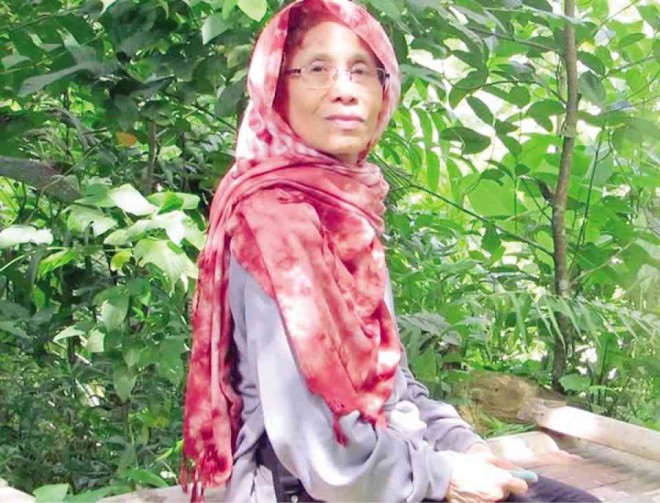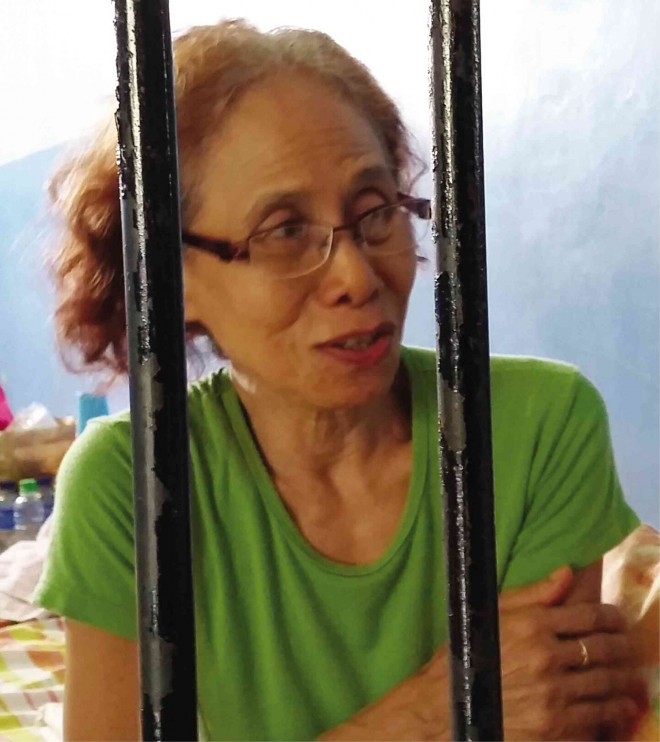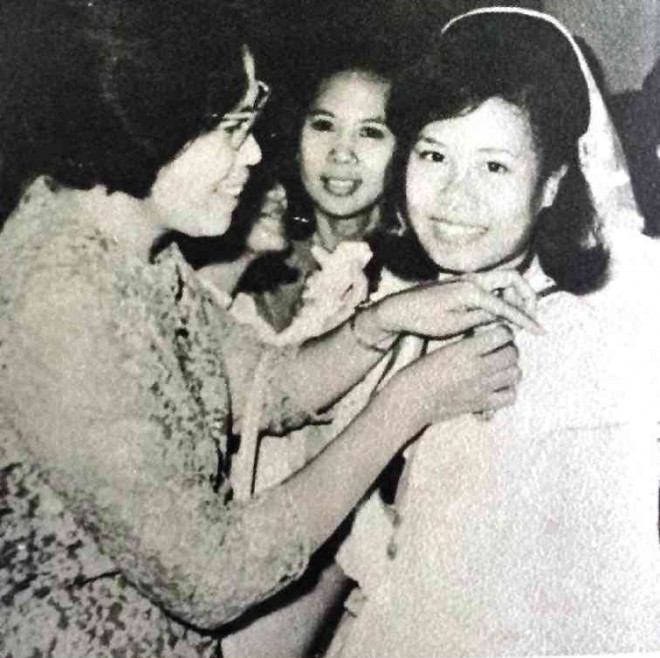
COMMUNIST guerrilla leader Maria Concepcion Araneta-Bocala, aka “Concha,” in the hinterlands of Panay Island while taping an audio-video statement. CONTRIBUTED PHOTO
MARIA Concepcion “Concha” Araneta wanted to be a journalist, so she took up mass communications at the University of the Philippines (UP) in Diliman, Quezon City, in the late 1960s, but contemplated whether to go into broadcast or print media.
“I thought that kind of work would entail me to go out in the field,” she said.
But like many students then, Araneta saw her life taking a sharp turn amid the turbulent political and economic crisis, and growing authoritarian rule of Ferdinand Marcos. She joined the Samahan ng Demokratikong Kabataan and was among those who went underground and joined the communist New People’s Army (NPA) shortly after Marcos declared martial law on Sept. 21, 1972.She would marry a comrade Pablito Araneta, who would later become a provincial board member, and later, another comrade, Reynaldo Bocala.
Forty-five years later, on Aug. 1, Concha Araneta-Bocala was captured by police and military intelligence agents in a raid on a rented house in Molo District, Iloilo City.
She has been tagged as a top leader of the Communist Party of the Philippines (CPP) and head of the CPP’s Panay regional committee, with a bounty of P7.8 million for her arrest.
Bocala, who will turn 65 on Aug. 26, has been charged with illegal possession of firearms and explosives, aside from pending murder and rebellion charges in courts
Peace talks
She has refuted the accusations and called her arrest illegal, insisting that she is a consultant for the Visayas in the peace negotiations between the government and the National Democratic Front (NDF), an umbrella of underground organizations including the CPP and NPA.
The government peace panel has dismissed her claim. As head of the CPP and NPA in Panay, the military says Bocala is responsible for rebel attacks that killed soldiers, policemen and militiamen, as well as destroyed public and private property.
“This is a victory for the people of Panay who desire for a just and lasting peace. The victims of CPP-NPA atrocities are expecting that justice will be served with the arrest of Bocala,” said Col. Eric Uchida, commander of Army’s 301st Brigade, which is responsible for internal security operations in Panay.
To her friends

NOW BEHIND bars in an Iloilo City jail, Maria Concepcion Araneta-Bocala looks back at her days in school and her role in the guerrilla movement.NESTOR P. BURGOS JR/INQUIRER VISAYAS
Landed clan
The fifth of 10 siblings, Bocala belongs to the landed Araneta clan in Negros Occidental province, which includes Judy Araneta-Roxas, the mother of Interior Secretary and presidential aspirant Manuel “Mar” Roxas II.
“She is very intelligent and good-natured, and went to Mass every Sunday,” said a former classmate at the then Assumption Convent in Iloilo City, where the rebel finished her elementary education and graduated valedictorian in high school in 1967.
It was at Assumption where she entertained thoughts of becoming a journalist. She topped the editorial examination for the school publication when she was in third year high school, but the post was given to a senior who had more experience.
“I had no idea what a school publication was, much less how to run one. Besides, I was busy socializing, attending jam sessions then,” Bocala told the Inquirer from her cell at the heavily guarded Molo District police station.
Fourth arrest
Bocala is no stranger to detention. Her arrest was her fourth since 1972. She was first held in Manila on Sept. 16, 1972, five days before martial law was declared and freed on bail after three days.
In 1979, she was arrested in Talisay town in Negros Occidental, a few days after she had given birth. She said she was subjected to sleep and food deprivation despite her condition.
On Sept 10, 1980, a day before the birthday of Marcos, Bocala and seven other political detainees escaped from Camp Martin Delgado in Iloilo City, by climbing through the ceiling of their stockade.
She rejoined the underground and surfaced in 1986 as one of the leaders of the NDF in Panay during the ceasefire period after the Edsa I People Power revolt that ousted Marcos. She met with then President Corazon “Cory” Aquino at Assumption Iloilo.
After the collapse of the peace talks, Bocala again went underground but was captured in April 1987 while visiting her parents’ house in Jaro District in Iloilo City.
Personal challenge
While in the underground, she said her greatest personal challenge was her separation from her children—one with Araneta and four with Bocala, an alleged regional CPP-NPA leader. “I constantly longed for them and I tried to compensate with letters. If there was an opportunity, I tried to be with them,” she said.
Decades as a rebel staying mostly in the mountains have taken its physical toll on her. Bocala has been taking medicines for hypertension and severe anemia, and has a history of pneumonia. She is also hypoglycemic and suffering from scoliosis, worsened by repeated falls in the mountains.
Retirement is farthest from her mind, however. “Our participation in the revolutionary struggle cannot be measured by just physical contribution but by what you can contribute even when you age,” she said.
She acknowledged that her capture would have a “temporary” impact on the rebel movement. “But nobody is indispensable and there will always be leaders to take over our work. At the same time, I will continue to contribute while I’m detained and if I’m released,” she said.

MARIA Concepcion Araneta-Bocala receives first honor award during her high school graduation at Assumption Iloilo in 1967. PHOTO from Assumption Iloilo yearbook Tidings
Flatfooted guerrilla
Former UP faculty regent Judy Taguiwalo, a political detainee during the Marcos dictatorship, recalled the first time she and Bocala went up the Madya-as mountain ranges in Panay in the early 1970s.
“An old farmer observed (that Bocala) was flatfooted and told her she would not be able to last as a guerrilla. She, of course, proved him wrong!” Taguiwalo said.
“Definitely, Concha has walked the path of armed revolution with courage and with boundless love for the people she pledged to serve,” she added.
Bocala has no regrets on the path she has taken. “I’m very much into mass communications,” she said. She then smiled at this reporter.
http://newsinfo.inquirer.net/711263/up-journalism-student-rewrites-life-to-lead-rebellion-in-panay

No comments:
Post a Comment
Note: Only a member of this blog may post a comment.